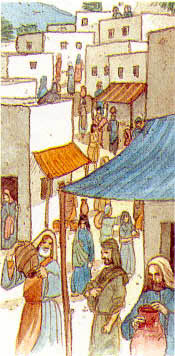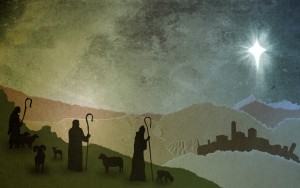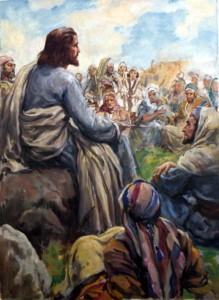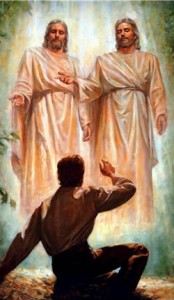Podcast: Play in new window | Download (Duration: 14:00 — 12.8MB)
Subscribe: Apple Podcasts | RSS
Podcast: Play in new window | Download (Duration: 14:00 — 12.8MB)
Subscribe: Apple Podcasts | RSS
As we come to the end of another year, it’s a good time to reflect on the past. Over the last ten years Mormon Coffee has been a busy place. Together we have discussed nearly 1,400 blog posts in an ongoing conversation comprised of over 52,000 comments. We’ve talked about Mormon history, Mormon doctrine, Mormon culture, and Mormon news — all within the blog’s context of a Christian/biblical worldview.
The goal has always been to speak the truth in love to the Mormon people, to come to a better understanding of the differences between Mormonism and Christianity, and to invite all to embrace God as He really is – to “love the  Lord your God with all your heart and with all your soul and with all your strength and with all your mind” (Luke 10:27). By God’s grace, these goals have been realized here to one degree or another. By God’s grace, it has been a good decade at Mormon Coffee, and I am profoundly grateful for what He has done.
Lord your God with all your heart and with all your soul and with all your strength and with all your mind” (Luke 10:27). By God’s grace, these goals have been realized here to one degree or another. By God’s grace, it has been a good decade at Mormon Coffee, and I am profoundly grateful for what He has done.
Ten years is a long time in the fast-paced and ever-expanding Internet world. When Mormon Coffee began, blogs were a relatively new forum; even YouTube was under a year old! Much has changed during this decade, and for our Mormon Coffee community, a big change comes along with this New Year.
Mormon Coffee is closing its doors (sort of). This is the last blog post for our favorite online coffee shop. The blog will remain accessible, but it will no longer be updated. Instead of the Mormon Coffee blog, Mormonism Research Ministry is beginning two new features on the mrm.org website: Mormonism in the News (where you will find me, and perhaps others, regularly contributing commentary in regards to the goings-on in Mormonism), and Mormonism Discussed (an evangelical forum for discussing Mormonism). I hope we will see all of you there.
Heartfelt thanks goes to the entire Mormon Coffee community. Thank you for reading, for commenting, and for encouraging one another to always seek God and His truth. That is, after all, what this blog has been about.
And so, as we move forward with Mormonism in the News and Mormonism Discussed, before we close the doors here at Mormon Coffee, I leave you with an excellent video. Though we have been saying all of this here for ten years, it’s good to say it again…and again…and again. Jeff Durbin presents The Gospel for Mormons. It is my desire – and the desire of all Christians here at Mormon Coffee – to plead with our Mormon friends once more: “Be reconciled to God.”
May God bless us all with ears to hear, eyes to see, and a heart that yearns for Him.
[Name withheld], I appreciate your comment, particularly about the Gospel of Luke. I 100% agree with this much: Mary’s comments seem strange and unlikely if she already had a sexual encounter.
Please consider 4 reasons why I think you are under-interpreting [Bruce] McConkie’s remarks:
1. The strength of McConkie’s comparison between the way men are begotten of mortal fathers. “Christ was begotten by an Immortal Father in the same way that mortal men are begotten by mortal fathers.” (Mormon Doctrine, 1979, pages 546-47)
2. Later in the same book he writes that Jesus “was begotten, conceived and born in the normal and natural course of events.” (1966, p. 742) It seems unlikely that McConkie would have viewed non-standard and abnormal ways of insemination in ~1966 as “the normal and natural course of events.”
3. He elsewhere connects this with his particular, reconfigured definition of “virgin.” While you and I agree that “virgin” speaks to the absence of relations / physical union altogether, McConkie seems to have thought of it in terms of the absence of relations with a particular kind of human (a mortal human). See Mormon Doctrine, 1979, pp 546-47; The Promised Messiah: The First Coming of Christ, p. 466; Doctrinal New Testament Commentary, vol. 1, p. 82.
4. McConkie’s remarks are consistent with remarks by other LDS leaders, who argue that “according to the flesh, [Heavenly Father and Mary] have been associated together in the capacity of Husband and Wife.” (“The Seer”, pp. 158-9; cf. B. H. Roberts, “Defense of the Faith and the Saints”, vol 2, p. 270). Apostle Melvin J. Ballard on this same topic argues that the same “creative power and function” that carnal man uses as “a mere harp of pleasure”, God himself was able to use in a righteous way with Mary. (http://emp.byui.edu/marrottr/BegettingofJesusChrist.htm)
In the last part of your comment, you argue,
“Even if there was actual sex [between God and Mary], if Mary was completely unaware that anything had happened, certainly we’d call her a virgin anyway. You wouldn’t call a date rape victim unchaste.”
I have talked to many Mormons about this issue, but I have never heard this argument before. I am at a loss for words.
Before I read your comment and in light of the conversation, I went upstairs to find my copy of LDS author Bruce E. Dana’s book, Mary, Mother of Jesus (2001), which I purchased at a BYU Bookstore (next to Cougareat) a few(?) years ago. Chapters 11-14 (pp 47-62) argue that the Father, who has a resurrected, glorified body, associated in the capacity of husband with Mary in a natural course of events. Also, that she was empowered to physically withstand his presence by the Holy Ghost, and did so without shame, coercion, or hesitancy. Perhaps you will at least find it useful to see how LDS authors like Bruce Dana deal with the evidence and make sense of it.
I believe in the more traditional idea of the virgin birth — there was zero male participation or physical contact or DNA contribution needed. Much like Genesis 1, it was an act of creation requiring no physical contact or sexual union, accomplished by the effortless, omnipotent word of God. The significance of the virgin birth is that God, who is entirely a different species than us, condescended in love to become one of us. The Word became flesh — beautiful and awesome.
Christianity: The Spirit created it by an effortless, touchless, omnipotent act. “That which is conceived in her is from the Holy Spirit.” (Matthew 1:20; cf. Luke 1:35) 100% of the DNA was mortal, and none of the DNA was transferred from any divine being.
20th century Mormonism: Heavenly Father (Adam’s spirit father) did via natural action. “He was begotten, conceived and born in the normal and natural course of events, for he is the Son of God, and that designation means what it says.” (Bruce McConkie, Mormon Doctrine, 1966, p. 742)
Brigham Young’s 19th century Mormonism: Adam, the Heavenly Father of our spirits, did. “Jesus, our elder brother, was begotten in the flesh by the same character that was in the garden of Eden, and who is our Father in Heaven.” (Journal of Discourses 1:50, 51)
One Mormon naturalistically argues:
“If the birth [of Jesus] had been truly virgin, then Jesus would have been female, as parthenogenesis invariably must result in female offspring, since there’s no Y chromosome available to make it otherwise.”
http://www.mormonapologetics.org/index.php…
(accessed December 17, 2010, domain since removed)
But if God was able to create the Y-chromosome from scratch (or at least from non-bodily materials) for Adam, why not with the Second Adam, Jesus Christ? As the angel to Mary explained John’s conception in Elizabeth: “For nothing will be impossible with God.” (Luke 1:37)
It was long ago, two thousand years, when sweet baby Jesus was born. Although every baby is cherished by his parents and grandparents and siblings and cousins, this little boy was precious to all the world. The story began in Nazareth…

The Old Testament patriarch Noah, who had died long ago and been resurrected as an angel named Gabriel,1 was sent from God to a city of Galilee, named Nazareth. There he appeared to one of the noblest and greatest of all the spirit offspring of God the Father,2 a young virgin girl whose name–Mary–had been foretold in 124 B.C.3 Mary was betrothed to a man named Joseph, of the house of David.
The angel Gabriel said to Mary, “Hail, you virgin, who are highly favored of the Lord, the Lord is with you: for you are chosen and blessed among women.”4 But Mary was troubled and pondered about this salutation. Gabriel told her not to be afraid; she had found favor with God. He said, “Behold, you will conceive and bear a son,5 and shall call his name, in the ‘pure language,’ Son Ahman.6 He will be great, and will be called the Son of the Highest. And you, Mary, will be the mother of God.”7
Mary said to the angel, “How can this be, since I am a virgin?”
Gabriel answered and said, “The Holy Ghost shall come upon you and sanctify you, and make you holy, and prepare you to endure the presence of ‘the Highest.’8 Then shall your Heavenly Father, who was your literal father in the pre-existence, overshadow you. For you know that He is a Holy Man and Adam is His name. He is our Father and our God, and the only God with whom we have to do. A personage of flesh and bone, He shall beget this Son in the same manner as Cain and Abel and all the other sons and daughters of Adam and Eve were begotten.9 The Christ Child shall be the result of ‘natural action’–flesh and blood, begotten of his Father as we were of our fathers.10 A miracle–though not in violation of natural law–the literal offspring of this ‘celestial Sireship’11 shall be called the ‘Only Begotten Son of God in the flesh.'”12
Mary was concerned because of her betrothal to Joseph. The angel explained, “You and the Father will associate together in the capacity of Husband and Wife; hence, you will be, for at least a time, the lawful wife of God the Father. After He is finished with you, the Father will give you to Joseph. God will be your first husband.13 Then shall it be said, ‘The man Joseph, the husband of Mary, did not, that we know of, have more than one wife, but Mary the wife of Joseph had another husband.'”14
And Mary said, “Behold the handmaid of the Lord; be it done to me according to your word.” And the angel departed from her.
Before Mary and Joseph came together Mary was found to be with child by God the Father. Joseph, not wanting Mary to be disgraced, planned to ‘divorce’ her quietly. But an angel of the Lord appeared to Joseph in a vision15 and said, “Do not be afraid to take Mary as your wife, for that which has been conceived in her, while it was not done without the aid of Man, that Man was God!16 And she will bear a Son; and you shall call His name Jesus, for it is He who will, by his perfect example, show the people how to fulfill the plan of salvation.”17 Now all this took place that what was spoken through the prophet Isaiah might be fulfilled, saying, “Behold, the virgin shall be with child, and shall bear a Son, and they shall call His name Immanuel,” which translated means, “A God with us.”18 The angel said, “Mary will still be called a virgin both before and after she gives birth19 because the Father of her child is immortal.”20 Therefore, Joseph did as the angel of the Lord commanded him.
It came about in those days that Caesar Augustus required a census be taken of all the earth and everyone was proceeding to each their own city to register. Joseph and Mary journeyed together to the land of Jerusalem,21 to the city of Bethlehem, in order to fulfill the requirement.
While they were at Jerusalem, on the 6th day of April,22 it was time for Mary’s baby to be born. She gave birth to her firstborn son, who had been her elder brother in the pre-existence,23 and wrapped him in swaddling clothes, and laid him in a manger; because there was none to give room for them in the inns.24
Now, this was the second birth of Jesus, for He was already the firstborn spirit child of Heavenly Parents.25 He had attained unto the status of Godhood while yet in the premortal existence.26 Whereas, at the time of His mortal birth Jesus was no longer an infant spirit, it was necessary that His spirit be compressed, or diminished in size, so He could be enclosed in His infant body.27 As a result, Jesus forgot everything about His former life.28 Nevertheless, He was the Son of God and the sign which had been promised came to pass: the sun set in America on the night of Christ’s birth, but there was no darkness; it was light as though it was mid-day even until the rising of the sun the next morning.29
 But around Jerusalem/Bethlehem it was dark and there were some shepherds out in the fields keeping night watch over their flock. An angel of the Lord appeared to them causing them to be very frightened. The shepherds desired to determine what manner of being this was, therefore they requested he shake hands. For they knew they would feel the flesh and bone of a true angel’s hand; if they could not feel it they would know he was the devil posing as an angel of light.30 Thereby detecting that this was a messenger from God, the shepherds allowed the angel to proceed.
But around Jerusalem/Bethlehem it was dark and there were some shepherds out in the fields keeping night watch over their flock. An angel of the Lord appeared to them causing them to be very frightened. The shepherds desired to determine what manner of being this was, therefore they requested he shake hands. For they knew they would feel the flesh and bone of a true angel’s hand; if they could not feel it they would know he was the devil posing as an angel of light.30 Thereby detecting that this was a messenger from God, the shepherds allowed the angel to proceed.
And the angel said to them, “Do not be afraid; for behold, I bring you good news of great joy which shall be for all the people; for today in the city of David there has been born for you the God of this world.31 He will be called ‘the Prince of Peace, who is also the Prince of Glory and the Prince of Eternal Progress.’32 He will atone for the sins of all mankind in the Garden of Gethsemane,33 and through His gift will come resurrection for the dead for all, and a greater and more enlarged opportunity for eternal life for those who will walk in obedience to His commandments.34 And no one will do a greater work than Jesus until the advent of the Prophet Joseph Smith.35 But take care that you not be led astray. For the time will come when much that is believed and taught about the cleansing power of Christ’s blood will be such utter nonsense and so palpably false that to believe it will be to lose your salvation. In that day many will believe or pretend to believe that if we confess Christ with our lips and avow that we accept Him as our personal Savior, we will thereby be saved. They will say that His blood, without any other act than mere belief, makes us clean.36 Be not deceived. Each of you will have to work very hard to qualify for your eternal potential.”37 Suddenly there appeared a heavenly host of persons who had been resurrected from the dead38 praising God, and saying, “Glory to God in the highest.” And it came to pass when the angels had gone away that the shepherds hastily found their way to Mary and Joseph, and the Christ Child as He lay in the manger. When they had seen this, they made known everything which had been revealed to them about the babe. And all who heard it wondered at the things which were told them by the shepherds.
Dear reader, what child is this?
The LDS Christmas Story was gathered and compiled from the teachings of Mormon Church leaders. It speaks of a Father and Son who are not found in the Biblical narrative of Christ’s birth. It brings the sad news that our salvation depends upon our own righteousness instead of the perfect righteousness of Jesus. The gift God gave that night, according to the LDS Christmas story, provided resurrection to judgement for all the world and an example to follow in order to make oneself worthy of the highest heaven.
Yet God tells a different story. He says it is impossible for us to be worthy of heaven on our own merit; all have sinned and our righteousness is as filthy rags before Him. But the blessed Gift God gave to us on that marvelous holy night was no less than His Promise fulfilled. Jesus Christ–God incarnate–had come, not to show us the way, but to be the Way. He came to a world dead in sin to give us life eternal. Let all who are alive in Christ echo Mary’s song, “My spirit hath rejoiced in God my Savior.”
Thanks be to God for His indescribable gift!
—
This article originally appeared in the winter 1995 edition of A Word in Season.
Jesus said in John 17:3, “And this is eternal life, that they know you the only true God, and Jesus Christ whom you have sent.” When I read this Bible verse, I usually think about the imperative call to know the only true God; eternal life is tied to the true God, and none other.
But in addition to knowing the only true God, this verse calls us to know the only true God. That is, Jesus is not focusing His teaching solely on who God is, but also on our relationship with Him. He says eternal life is knowing God. An additional truth intrinsic in Jesus’ words is that if we know Him, we will also be known by Him. Eternal life is knowing – and being known by – the only true God.
 Jesus talked about knowing His people intimately. He said, “I am the good shepherd. I know my own and my own know me” (John 10:14). Christian theologian John Piper explained this beautiful relationship between Jesus and His sheep:
Jesus talked about knowing His people intimately. He said, “I am the good shepherd. I know my own and my own know me” (John 10:14). Christian theologian John Piper explained this beautiful relationship between Jesus and His sheep:
“My sheep hear my voice, and I know them.” (John 10:27)
Jesus knows those who are his. What is this knowledge?
John 10:3 is a close parallel to verse 27. It says, “The sheep hear his voice, he calls his own sheep by name, and he leads them out.”
So when Jesus says, “I know them,” this means at least that he knows them by name; that is, he knows them individually and intimately. They are not anonymous, lost in the flock.
Verse 14 provides another insight: “I am the good shepherd, and I know my own and my own know me, even as the Father knows me and I know the Father.”
There is a real similarity between the way Jesus knows his Father in heaven and the way he knows his sheep. Jesus sees himself in the Father, and he sees himself in his disciples.
To some degree Jesus recognizes his own character in his disciples. He sees his own brand mark on the sheep.
He is like a husband waiting for his wife at the airport, watching as each person disembarks from the plane. When she appears, he knows her, he recognizes her features, he delights in her, she is the only one he embraces.
The apostle Paul puts it like this: “The firm foundation of God stands, having this seal, ‘The Lord knows those who are his’” (2 Timothy 2:19).
It is hard to overemphasize what a tremendous privilege it is to be known personally, intimately, lovingly by the Son of God. It is a precious gift to all his sheep, and it contains within it the promise of eternal life. (“Jesus Knows His Sheep”)
It is an indescribable blessing to know God and be known by Him. But not all people enjoy this intimate relationship with their Savior.
 As Jesus preached what is known as the Sermon on the Mount, He warned us to “beware of false prophets”; these people look like His sheep, but they are really “ravenous wolves” (Matthew 7:15). Their message may sound attractive, but their fruit will prove otherwise (see 1 Timothy 1:3; 1 Timothy 6:3-4; 2 Timothy 2:18; 2 Peter 2:1).
As Jesus preached what is known as the Sermon on the Mount, He warned us to “beware of false prophets”; these people look like His sheep, but they are really “ravenous wolves” (Matthew 7:15). Their message may sound attractive, but their fruit will prove otherwise (see 1 Timothy 1:3; 1 Timothy 6:3-4; 2 Timothy 2:18; 2 Peter 2:1).
In this context, Jesus notes, “Not everyone who says to me, ‘Lord, Lord,’ will enter the kingdom of heaven…” Not everyone who has knowledge of Jesus, not everyone who does “many mighty works” in His name, will receive eternal life. Jesus said “many” will appeal to Him for admittance into heaven on this basis, but He will send them away: “And then I will declare to them, ‘I never knew you; depart from me.’”
Juxtaposed against Jesus’ tragic declaration is its polar opposite. Eternal life is in knowing the only true God – and being known by Him. Personally. Intimately. Lovingly.
The great tragedy is that Mormonism, while demonstrating what look like “mighty works” in the name of Jesus, still leads people away from the one true God. Mormonism leads people to follow and worship a different god. Whatever this different god is, knowing and being known by it cannot lead to eternal life. Jesus made this very clear.
Friends, turn away from the impotent god of Mormonism; seek to know the one true God. His promise is sure: “My sheep hear my voice, and I know them, and they follow me. I give them eternal life, and they will never perish” (John 10:27-28).
PSALM 23 from SourceFlix.com on Vimeo.
A unique but central tenet of the Mormon faith is found in the LDS Scripture Doctrine and Covenants 130:22. It says,
“The Father [God] has a body of flesh and bones as tangible as man’s…”
Mormon Prophet Gordon B. Hinckley defended this doctrine from the Bible:
“In His image man was created. …In the account of the Creation of the earth, ‘God said, Let us make man in our image, after our likeness’ (Gen. 1:26). Could any language be more explicit?” (Gordon B. Hinckley, First Presidency Message, “The Father, Son, and Holy Ghost,” Ensign, March 1998, 2)
 Furthermore, the LDS web site designed for people investigating the Mormon faith states,
Furthermore, the LDS web site designed for people investigating the Mormon faith states,
“We are created in God’s image. In the Old Testament God said, ‘Let us make man in our own image, after our likeness’ …God the Father and His son Jesus Christ, appeared to Joseph Smith in the spring of 1820. Joseph revealed that the Father and the Son each have a ‘body of flesh and bones as tangible as man’s’ (D&C 130:22). God is our Heavenly Father, and we are created in his image.” [This quoted passage is no longer found at Mormon.org.]
Indeed, Mormons often scoff at Christians who believe the Bible instead teaches God the Father is an invisible Being of spirit, without flesh and bones. (See John 4:24; Luke 24:39; Hebrews 11:27; etc.) They ask, “What else can it mean when God says He created man in His image?”
Christian theologian A.W. Tozer wrote,
“When the Scripture states that man was made in the image of God, we dare not add to that statement an idea from our own head and make it mean ‘in the exact image.’ To do so is to make man a replica of God, and that is to lose the unicity of God and end with no God at all. It is to break down the wall, infinitely high, that separates That-which-is-God from that which-is-not-God. To think of creature and Creator as alike in essential being is to rob God of most of His attributes and reduce Him to the status of a creature. It is, for instance, to rob Him of His infinitude: there cannot be two unlimited substances in the universe. It is to take away His sovereignty: there cannot be two absolutely free beings in the universe, for sooner or later two completely free wills must collide. These attributes, to mention no more, require that there be but one to whom they belong.
“When we try to imagine what God is like we must of necessity use that-which-is-not-God as the raw material for our minds to work on; hence whatever we visualize God to be, He is not, for we have constructed our image out of that which He has made and what He has made is not God. If we insist upon trying to imagine Him, we end with an idol, made not with hands but with thoughts; and an idol of the mind is as offensive to God as an idol of the hand.” (A. W. Tozer, “God Incomprehensible” in The Knowledge of the Holy)
Yet God Himself speaks of His image. Christian author and speaker Adrian Plass pondered this. He understood Paul taught in Colossians 1:15 that Christ is the image of the invisible God. But what, exactly, is the image of something that is invisible? Mr. Plass wrote a poem that well describes how Jesus is the image of the invisible God — an image human beings are created to display.
Image of the Invisible God
A lover of nature
Committed
Aggressive
Accessible
Uncompromising
Strangely meek
A story-teller
Master of timing
Hard-working
Relaxed
Emotional
Passionate
Compassionate
Prayerful
A radical
A wit
A good Son
A good friend
He enjoyed parties
He relished the company of people
But He did not trust the hearts of men.
Filled with sadness
Filled with joy
Filled with love
Filled with frustration
He adored children
Because they reminded Him of home.
He broke His own rules
He was angry with enemies and disciples
Happy to get down on His knees to wash feet
A man with secret friends
Needy
Troubled
Terrified
Obedient
Lost and lonely
Neglected and very badly hurt
So courageous
Unpredictable
Dead
Alive
Triumphant
Forgiving
Loves the lost
A man who knows how to cook fish.
Image of the invisible God.

Image of the Invisible God Copyright © 2003 Adrian Plass. Used by permission. To visit Mr. Plass’ web site click here.
—
This article has been modified from the original, which first appeared on the website Questioning Mormonism in 2003. Many thanks to Rob Silvulka for bringing the A. W. Tozer quote to my attention.
1. Since our inheritance in Christ is infinite and immeasurable, it will take eternity to appropriate and enjoy. Ephesians 2:7 implies eternal progression: “so that in the coming ages he might show the immeasurable riches of his grace in kindness toward us in Christ Jesus.” Ever-increasingly beholding the kindness of Jesus.
2. Since our inheritance is received, we may never rightly boast in ourselves. To us it can be said, “What do you have that you did not receive? And if you did receive it, why do you boast as though you did not?” (1 Corinthians 4:7) But of God alone it can be said, “For from him and through him and to him are all things.” (Romans 11:36)
3. Since our inheritance is that of being conformed to another, we cannot rightly claim to be the original, the prototype, or the “firstborn.” “For those whom he foreknew he also predestined to be conformed to the image of his Son, in order that he might be the firstborn among many brothers.” (Romans 8:29) The sons are conformed to the image of the Son. Why? “That in everything he might be preeminent.” (Colossians 1:18)